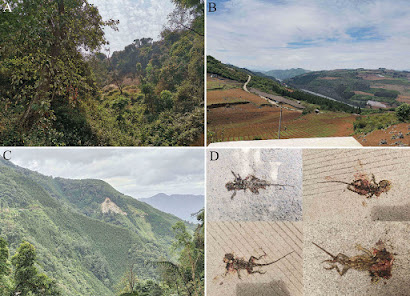 |
| Acanthosaura liui Liu, Hou, Mo & Rao, 2020 |
Abstract
A new species of Acanthosaura from Yunnan, China, is described based on morphological and genetic data. The new species can be separated from all other species of the genus by having a different shape of the black eye patch, a different coloration of the postorbital and occipital spines and nuchal crest, and a different color of the gular pouch. Genetically, uncorrected sequence divergences of COI between the new species and investigated congeners ranged from 16.12% to 24.11%. The conservation status of the new species is also discussed.
Keywords: endangered, Honghe, lizard, taxonomy
Acanthosaura liui sp. nov.
Diagnosis: Body size medium (SVL 85.1–95.9 mm), postorbital and occipital spines present; relatively developed gular pouch; scales on flanks randomly intermixed with medium and large scales; nuchal crest gradually developed posteriorly, first nuchal crest spine shortest and last nuchal crest spine longest; diastema between nuchal and dorsal crests present; dorsal crest underdeveloped, composed of enlarged, pointed scales beginning at shoulder region and decreasing regularly in size; tail 1.47–1.77× SVL; number of subdigital lamellae on the fourth finger 16–18 and the fourth toe 22–25; black nuchal collar present; black eye patch extending from nostril through orbit posteriorly and downwards through tympanum and then posteriorly and upwards meeting diamond-shaped black nuchal collar on nape; black oblique folds anterior to forelimb insertions present and not meeting black nuchal collar; anterior nuchal crest spines and dorsal sides of postorbital and occipital spines light colored, posterior nuchal crest spines and ventral sides of postorbital and occipital spines black; gular pouch light blue; tongue and inside of mouth yellow.
Etymology: The specific epithet is dedicated to the renowned herpetologist Prof. Chengzhao Liu (30.9.1900–9.4.1976), in recognition of his great contributions to herpetological research in China.
 |
| Figure 8. Live Acanthosaura liui sp. nov. in the field. A an adult male asleep on a branch B an adult male asleep on dead leaves C an adult female asleep on a branch D an adult male on the ground. |
Distribution: After our extensive field investigation, Acanthosaura liui sp. nov. is only recorded in Jianshui County, Gejiu City, and Shiping County, Honghe Autonomous Prefecture, Yunnan, China.
Natural history: The specimens of Acanthosaura liui sp. nov. were all found at night while they were asleep on trees beside rivers. At the type locality, we found seven other species of reptiles, namely Hebius atemporale (Bourret, 1934), Ophiophagus hannah (Cantor, 1836), Oreocryptophis porphyraceus (Cantor, 1839), Pareas margaritophorus (Jan, 1866), Ptyas major (Günther, 1858), P. nigromarginata (Blyth, 1854), and Sphenomorphus indicus (Gray, 1853), and three species of amphibians, namely Hyla annectans (Jerdon, 1870), Nidirana pleuraden (Boulenger, 1904), and Polypedates megacephalus Hallowell, 1861.
Shuo Liu, Mian Hou, Mingzhong Mo and Dingqi Rao. 2020. A New Species of the Genus Acanthosaura (Squamata, Agamidae) from Yunnan, China, with Comments on its Conservation Status. ZooKeys. 959: 113-135. DOI: 10.3897/zookeys.959.54601









